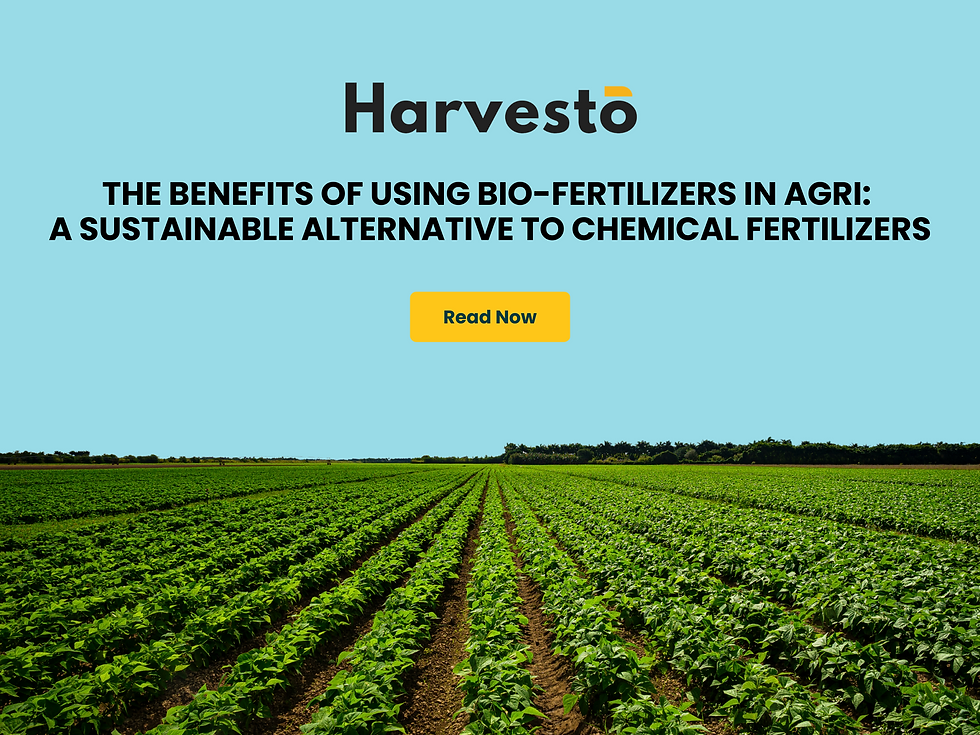The Benefits of Using Bio-Fertilizers in Agri: A Sustainable Alternative to Chemical Fertilizers
- Harvesto Group
- Dec 18, 2022
- 2 min read
Bio-fertilizers are a type of fertilizer made from living microorganisms that are applied to plants in order to improve the soil and provide essential nutrients to the plants. They are a sustainable and natural alternative to chemical fertilizers, which are made from synthetic substances and can have negative impacts on the environment and human health. In this article, we will discuss the benefits of bio-fertilizers over chemical fertilizers and how they can be used in agriculture.

One of the main benefits of bio-fertilizers is that they are organic and natural, which means that they do not contain any synthetic chemicals or toxic substances. This makes them safer for the environment and for human health, as they do not pollute the air, water, or soil with harmful chemicals. Bio-fertilizers are also less likely to leach into groundwater, which can contaminate drinking water and harm aquatic ecosystems.
Another advantage of bio-fertilizers is that they help to improve the overall health of the soil. Many chemical fertilizers can alter the pH balance of the soil, which can make it inhospitable to certain types of plants. Bio-fertilizers, on the other hand, contain beneficial microorganisms that help to improve the soil structure and fertility, making it more conducive to plant growth. In addition, bio-fertilizers can help to increase the nutrient content of the soil, providing plants with essential nutrients such as nitrogen, phosphorus, and potassium.
Bio-fertilizers can also be more cost-effective than chemical fertilizers, as they are often cheaper to produce and require less frequent application. They are also more efficient at delivering nutrients to plants, as the microorganisms in bio-fertilizers are able to break down and release nutrients more slowly over time. This means that plants are able to access the nutrients they need more consistently, leading to healthier and more robust growth.
There are several types of bio-fertilizers available, including nitrogen-fixing bacteria, which help to convert nitrogen gas from the air into a form that plants can use, and phosphorous-solubilizing bacteria, which help to release phosphorous from the soil and make it available to plants. There are also bio-fertilizers that contain fungi, which help to break down organic matter and release nutrients into the soil.
To use bio-fertilizers, they should be mixed into the soil or applied directly to the plants. It is important to follow the instructions provided by the manufacturer, as different types of bio-fertilizers may have different application rates and methods. It is also important to keep in mind that bio-fertilizers may not provide all of the nutrients that plants need, so it may be necessary to supplement with other types of fertilizers or organic matter.
In conclusion, bio-fertilizers are a sustainable and natural alternative to chemical fertilizers that can provide numerous benefits for both the environment and for agriculture. They are safer for the environment and for human health, help to improve the soil structure and fertility, and are more cost-effective and efficient at delivering nutrients to plants. If you are interested in using bio-fertilizers in your garden or farm, be sure to research the different types available and follow the instructions provided by the manufacturer.

Comments